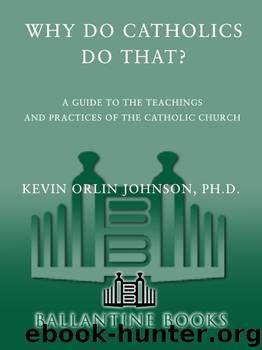Why Do Catholics Do That?: A Guide to the Teachings and Practices of the Catholic Church by Kevin Orlin Johnson

Author:Kevin Orlin Johnson [Johnson, Kevin Orlin]
Language: eng
Format: mobi
ISBN: 9780307803443
Publisher: Random House Publishing Group
Published: 2011-07-26T16:00:00+00:00
* The author wants it made clear at the outset that he believes absolutely in the right of all people to pursue happiness any way they want to (as long as the rights of others are preserved, of course). This section simply attempts to be an accurate (but unofficial) report of the Church’s viewpoint on these matters, in the context of a society like ours, where personal choices are often made without reference to the Church’s teachings or, indeed, to consequences. Anyway, it makes sense to listen to the Church when you’re picking a lifestyle—no organization has observed more case histories or learned as much about what works and what doesn’t—but as far as the author’s personally concerned, you’re on your own.
* While we’re on the subject, you often run into cases where people might not be sinning, but it sure looks like it, as when people of opposite gender live together without intimate relations but also without marriage, or even when an otherwise decent person attends an X-rated event, thinking it harmless. But publicly giving the appearance of sin, or appearing to condone sin, is called scandal, and it’s a sin, too—leading little ones astray, and all.
* The hierarchy’s response to some problems has seemed tragically inadequate, but they’re not necessarily being obtuse. Because priests are there to listen and sympathize, some disaffected persons of all conditions—bereaved, traumatized, lonely, elderly, children and men as well as women—do develop disproportionate feelings toward them. Predictably, a small percentage of these people, disappointed perhaps in their expectations, will accuse priests of some kind of wrongdoing, perhaps even illicit sex. One person making one complaint to a bishop, or—worse—harassing a bishop by repeating unsubstantiated charges, therefore, may reasonably be assumed to fall into this category (canon law treats such accusations specifically, in Canons 982 and 1390). Normally the priest is entirely innocent, which is presumed, and the complainants can be helped adequately and humanely by purely pastoral means; if the local hierarchy hears nothing more about it, they can only assume that the matter has been handled appropriately. But canon law mandates severe penalties for any priestly impropriety, particularly for violating the Sixth Commandment or even proposing to violate it (Canons 1387, 1394, 1395). So if there is a real problem, people need to register it in writing to help distinguish it from the distraught or vindictive false alarms. Of course, with hindsight, it’s easy to make that distinction, but the laity must not fail in its duty to follow up at the time, referring it upward to Rome if necessary; the obligation to denounce such an occurrence is considered grave.
Download
This site does not store any files on its server. We only index and link to content provided by other sites. Please contact the content providers to delete copyright contents if any and email us, we'll remove relevant links or contents immediately.
Resisting Happiness by Matthew Kelly(3337)
The Social Psychology of Inequality by Unknown(3018)
Day by Elie Wiesel(2781)
Designing Your Life by Bill Burnett(2740)
The Giving Tree by Shel Silverstein(2336)
Human Design by Chetan Parkyn(2068)
The Supreme Gift by Paulo Coelho(1962)
Angels of God: The Bible, the Church and the Heavenly Hosts by Mike Aquilina(1957)
Jesus of Nazareth by Joseph Ratzinger(1811)
Hostage to the Devil by Malachi Martin(1800)
Augustine: Conversions to Confessions by Robin Lane Fox(1769)
7 Secrets of Divine Mercy by Vinny Flynn(1741)
Dark Mysteries of the Vatican by H. Paul Jeffers(1715)
The Vatican Pimpernel by Brian Fleming(1699)
St. Thomas Aquinas by G. K. Chesterton(1632)
Saints & Angels by Doreen Virtue(1603)
The Ratline by Philippe Sands(1571)
My Daily Catholic Bible, NABRE by Thigpen Edited by Dr. Paul(1498)
Called to Life by Jacques Philippe(1475)
